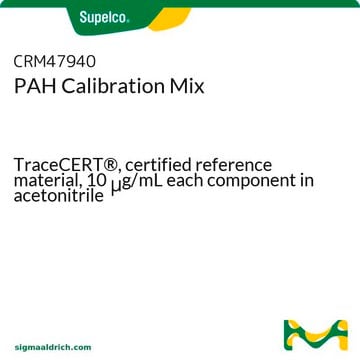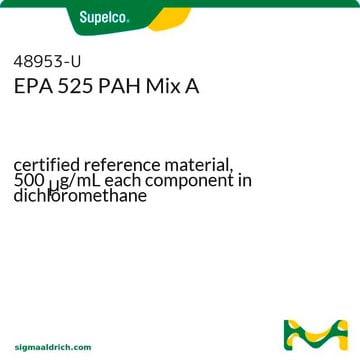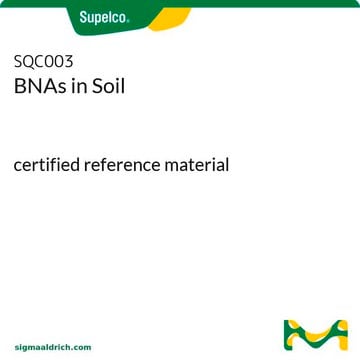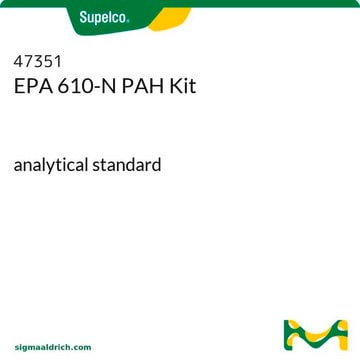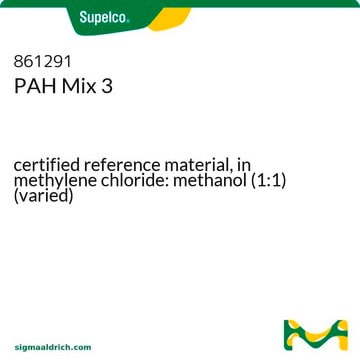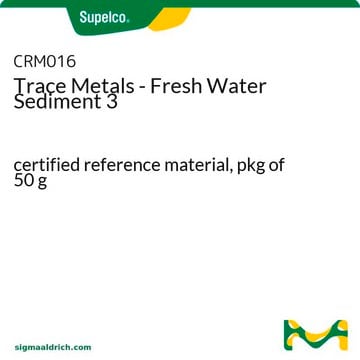CRM104
PAH - Sediment 1
certified reference material, pkg of 50 g
Se connecterpour consulter vos tarifs contractuels et ceux de votre entreprise/organisme
About This Item
Code UNSPSC :
41116107
Nomenclature NACRES :
NA.24
Produits recommandés
Qualité
certified reference material
Niveau de qualité
CofA (certificat d'analyse)
current certificate can be downloaded
Conditionnement
pkg of 50 g
Fabricant/nom de marque
RTC CRM104-050
Technique(s)
HPLC: suitable
gas chromatography (GC): suitable
Matrice
soil
pH
7.19
Application(s)
environmental
Format
matrix material
Température de stockage
2-8°C
Description générale
This Certified Reference Material (CRM) is produced and certified in accordance with ISO 17034 and ISO/IEC 17025. All information regarding the use of this CRM can be found on the certificate of analysis.
Application
PAH Sediment 1 has been used as a certified reference material for the quantification of polycyclic aromatic hydrocarbons in:
Refer to the product′s Certificate of Analysis for more information on a suitable instrument technique. Contact Technical Service for further support.
- Soil samples using laser-based ion mobility (IM) spectrometry.
- Complex matrices using atmospheric pressure solid analysis probe (ASAP) coupled to quadrupole-time of flight mass spectrometry (Q-TOF-MS).
Refer to the product′s Certificate of Analysis for more information on a suitable instrument technique. Contact Technical Service for further support.
Autres remarques
Values of analytes vary lot to lot. Some lots may not contain all analytes.
Analyte
Description
Acenaphthene
Benz[a]anthracene solution
Benzo[b]fluoranthene
Benzo[k]fluoranthene
Benzo[ghi]perylene
Benzo[a]pyrene
Chrysene
Dibenz[a,h]anthracene
Fluoranthene
Fluorene
Anthracene
Phenanthrene
Acenaphthylene
Indeno[1,2,3-cd]pyrene
Pyrene
Afficher tout (15)
Produit(s) apparenté(s)
Réf. du produit
Description
Tarif
Mention d'avertissement
Danger
Mentions de danger
Conseils de prudence
Point d'éclair (°F)
Not applicable
Point d'éclair (°C)
Not applicable
Faites votre choix parmi les versions les plus récentes :
Déjà en possession de ce produit ?
Retrouvez la documentation relative aux produits que vous avez récemment achetés dans la Bibliothèque de documents.
Atmospheric pressure solid analysis probe coupled to quadrupole-time of flight mass spectrometry as a tool for screening and semi-quantitative approach of polycyclic aromatic hydrocarbons, nitro-polycyclic aromatic hydrocarbons and oxo-polycyclic aromatic hydrocarbons in complex matrices
Carrizo D, et al.
Talanta, 131, 175-184 (2015)
Application of laser-based ion mobility (IM) spectrometry for the analysis of polycyclic aromatic compounds (PAC) and petroleum products in soils
Illenseer C, et al.
Journal of Environmental Monitoring, 5(5), 780-785 (2003)
Tumelo M Mogashane et al.
Journal of environmental science and health. Part A, Toxic/hazardous substances & environmental engineering, 55(1), 71-81 (2019-09-19)
The presence of polycyclic aromatic hydrocarbons (PAHs) in the environment is of major concern since some of these compounds are highly persistent, toxic (causing cancer) and wide spread pollutants. The objective of this study was to evaluate the levels of
Mary-Claire Buell et al.
Environmental pollution (Barking, Essex : 1987), 270, 116058-116058 (2020-12-07)
As a result of historical industrial activity, the sediments in the inner harbor of Owen Sound Bay in the northeastern part of Lake Huron in Ontario, Canada are contaminated with organic compounds. The present study showed that the concentrations of
F Portet-Koltalo et al.
Talanta, 221, 121601-121601 (2020-10-21)
A simple, efficient matrix solid phase dispersive extraction (MSPD) method was optimised to analyse simultaneously polycyclic aromatic hydrocarbons (PAHs) and polychlorobiphenyls (PCBs) from sediments, and was compared to microwave-assisted extraction (MAE). New dispersing agents were tested to improve MSPD extraction.
Notre équipe de scientifiques dispose d'une expérience dans tous les secteurs de la recherche, notamment en sciences de la vie, science des matériaux, synthèse chimique, chromatographie, analyse et dans de nombreux autres domaines..
Contacter notre Service technique
